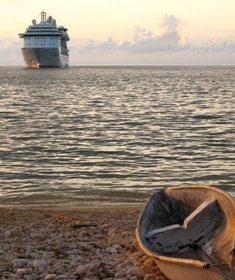Archive for August 24th, 2011

Anglin won’t take stand when crown closes case
(CNS): Devon Anglin will not take the stand or call witnesses in answer to the crown’s case against him for the murder of four year old Jeremiah Barnes lastyear. Despite changes to the criminal evidence act Anglin was arrested just weeks before the new bill was passed which now allows a judge or jury to draw a negative inference if a defendant doesn’t answer charges. This means that in this case the judge cannot lawfully hold Anglin’s silence against him. With no defence witnesses to be called tomorrow once the prosecution closes its case leading counsel will present their closing speeches to the court. During today’s proceedings the lead investigator on the case and one of the crown’s last witnesses was lauded by the judge when he congratulated him on the thoroughness of the investigation.
As former RCIPS DCI Peter Kennett concluded his evidence from the witness stand in connection with his role as lead investigator on the case, on Wednesday, Justice Howard Cooke told the former top cop who has now retired that he had overseen and conducted a painstakingly, thorough investigation. Referring to the written evidence before him the judge said whatever the outcome of the case it was evident that no stone had been left unturned in the police investigation.
During his time on the stand Kennet confirmed that he had been the officer to take the very first statements from Jeremiah’s parents on the night of the shooting and within hours of their child’s murder. He revealed how both of them had been traumatized by the death and were both extremely upset and in shock, but the senior officer said he felt it was extremely important to get an early account of what had happened to Jeremiah.
The case resumes at 10am tomorrow morning when the crown will read in a number of witness statements to the record which are uncontested evidence.

Scientists find option to GM mozzies for dengue
 (AF): Scientists have made a promising advance for controlling dengue fever, a tropical disease spread by mosquito bites. They've rapidly replaced mosquitoes in the wild with skeeters that don't spread the dengue virus.Some scientists have been trying to fight dengue by limiting mosquito populations. That was the goal in releasing genetically modified mosquitoes last year at sites in Malaysia and the Cayman Islands. Australian scientists took a different tack, they report in Thursday's issue of the journal Nature.First, they showed that Aedes aegypti mosquitoes, the chief carriers of the dengue virus, resist spreading that virus if they are infected with a particular kind of bacteria.
(AF): Scientists have made a promising advance for controlling dengue fever, a tropical disease spread by mosquito bites. They've rapidly replaced mosquitoes in the wild with skeeters that don't spread the dengue virus.Some scientists have been trying to fight dengue by limiting mosquito populations. That was the goal in releasing genetically modified mosquitoes last year at sites in Malaysia and the Cayman Islands. Australian scientists took a different tack, they report in Thursday's issue of the journal Nature.First, they showed that Aedes aegypti mosquitoes, the chief carriers of the dengue virus, resist spreading that virus if they are infected with a particular kind of bacteria.
Then they tested whether these resistant mosquitoes could displace their ordinary cousins in the wild, thus reducing the number of dengue-spreading mosquitoes. The resistant mosquitoes have an advantage in reproduction. Resistant females can mate with either resistant or ordinary mosquitoes, and all their offspring will be resistant. But when ordinary females mate with a resistant male, none of the offspring survive.

Mac lost CI$450k public cash
 (CNS): The decision made by the Cayman Islands premier to circumvent the proper process in acquiring financing for government cost the public purse CI$450,000, the auditor general has revealed. In his latest damning report of government's handling of the procurement process, Alastair Swarbrick raises several very serious concerns about the events which led to the cancellation of the tendering process in favour of a deal that not only failed to deliver the promised savings but in the end resulted in a serious loss to government's coffers. He says the decision to go with Cohen & Co, which promised to save government $24 million on the long term loan, was made directly by the premier against ministerial advice and without any evidence that the savings were possible.
(CNS): The decision made by the Cayman Islands premier to circumvent the proper process in acquiring financing for government cost the public purse CI$450,000, the auditor general has revealed. In his latest damning report of government's handling of the procurement process, Alastair Swarbrick raises several very serious concerns about the events which led to the cancellation of the tendering process in favour of a deal that not only failed to deliver the promised savings but in the end resulted in a serious loss to government's coffers. He says the decision to go with Cohen & Co, which promised to save government $24 million on the long term loan, was made directly by the premier against ministerial advice and without any evidence that the savings were possible.
In his latest report, which uses three cases studies to illustrate the myriad problems in government procurement, the auditor general shows that when the proper process is ignored things can go very wrong when it comes to value for money for public cash. The government loan case study demonstrates clearly how, when the process was circumvented, the government lost money but once it came back on track during the third bid, following the regulations and engaging proper expertise, the public did end up with value for money.
However, before that occurred two tendering process were cancelled and the premier in his role as finance minister had turned to party officials to advice him about securing a $155 million loan for government.
According to Swarbrick's report, McKeeva Bush claimed that he abandoned the tendering process for the financing because he believed he could save government money and to avoid what he said was a conflict of interest regarding one government official involved in the bids, whose family member worked at one of the banks in the joint venture which had come out on top.
Swarbrick notes that the Public Management and Finance Law has a provision which allows the minister of finance to to secure a loan for government but he said it should still have been a transparent, fair and open process. He also raised concerns that the premier had gone to a the United Democratic Party treasurer, Peter Young, and not sought advice from a government civil servant or a government contracted expert with a specific accountable remit.
He said that there was no paper trail or documented transparency on the premier's decision to go to the political party ranks for advise or how Young had introduced Bush to Cohen and Co, but Swarbrick indicated that Young was familiar with some of the principals at the New York finance house. The auditor said that there was no evidence that Young had been paid any fees by government as a result of the introduction.
Once the introduction had been made, Cohen presented the premier with a proposal that promised to deliver $24 million in savings on the $155m loan, which Bush had been authorized to secure by the FCO to help government pay its bills during the 2010/11 financial year.
However, ministerial officials advised the premier against signing a deal with Cohen as they did not believe the promises made by Cohen were achievable. Despite that advice, the premier chose to sign the deal and commit the government to lending from Cohen and Co and the subsequent significant loses.
“We did not find any support or documentation for the decision,” Swarbrick revealed, adding that the decision was based purely on a written submission made by Cohen. “We saw no analysis to say the promises were achievable and the ministry officials did not believe they were.”
The ministry officials were proved right in the end as government was forced to withdraw from the agreement when the New York firm was unable to provide the promised savings and what they offered would have cost the country significantly more than the winning bid in the first tendering process.
The premier did not extricate government from the potentially costly financing deal, however, before two short term financing loans had been arranged via Cohen with SoctiaBank and Banque Havilland, which the auditor said proved very costly. On the short term and stop gap loans government incurred costs that exceeded those it would have paid it it had gone with the legitimate winner in the CTC bid by over a half million US dollars.
Swarbrick stated that the report highlights issues that his office brought to light in his first report. In particular, where the loan is concerned, it demonstrates the problems of both political interference and what happens when there is blatant disregard for the process.
“Government got the best deal when it followed the process properly,” he said. “This demonstrates that there is validity to the rules being in place and being followed.”
Swarbrick also noted that in the case of the Cohen loan the premier may not have directly broken the Public Management and Finance Law, which allows him to procure a government loan, but he did contravene the regulations and what he did was outside the accepted norms of good governance, transparency and fairness and above all value for money. He also noted that there is some conflict in the clause that allows the premier to secure a loan for government with the rest of the public finance law.
Check back to CNS later for more from the auditor general's report regarding the complete failure of the DoT to tender a contract over $1.2 million, in direct contravention of the law, and for the problems surrounding the CCTV bid, which the auditor states was unnecessarily held up as a result of Cabinet interference.

Mac costs public purse CI$450K
(CNS): The decision made by the Cayman Islands premier to circumvent the proper process in acquiring financing for government cost the public purse CI$450,000 the auditor general has revealed. In his latest damning report of government's handling of the procurement process Alastair Swarbrick raises several very serious concerns about the events which led to the cancellation of the tendering process in favour of a deal that not only failed to deliver the promised savings but in the end resulted in a serious loss to government's coffers. He says the decision to go with Cohen & Co which promised to save government $24million on the long term loan was made directly by the premier against ministerial advice and without any evidence that the savings were possible.
In his latest report which uses three cases studies to illustrate the myriad problems in government procurement the auditor general shows that when the proper process is ignored things can go very wrong when it comes to value for money for public cash. The government loan case study demonstrates clearly how when the process was circumvented the government lost money but once it came back on track during the third bid, following the regulations and engaging proper expertise the public did end up with value for money.
However, before that occurred two tendering process were cancelled and the premier in his role as finance minister had turned to party officials to advice him about securing a $155million loan for government.
According to Swarbrick's report McKeeva Bush claimed that he abandoned the tendering process for the financing because as he believed he could save government money and to avoid what he said was a conflict of interest among one government official involved in the bids who's family member worked at one of the banks in the joint venture which had come out on top.
Swarbrick notes that the public management and finance law has a provision which allows the minister of finance to to secure a loan for government but he said it should still have been a transparent, fair and open process. He also raised concerns that the premier had gone to a the United Democratic Party treasure – Peter Young and not sought advice from a government civil servant or a government contracted expert with a specific accountable remit.
He said that there was no paper trail or documented transparency on the premier's decision to go to the political party ranks for advise or how Young had introduced Bush to Cohen and Co but Swarbrick indicated that Young was familiar with some of the principals at the New York finance house. The auditor said that there was no evidence that Young had been paid any fees by government as a result of the introduction.
Once the introduction had been made Cohen presented the premier with a proposal that promised to deliver $24million in savings on the $155k loan which Bush had been authorized to secure by the FCO to help government pay its bills during the 2010/11 financial year.
However, ministerial officials advised the premier against signing a deal withCohen as they did not believe the promises made by Cohen were achievable. Despite that advice the premier chose to sign the deal and commit the government to lending from Cohen and Co and the subsequent significant loses.
“We did not find any support or documentation for the decision,” Swarbrick revealed adding that the decision was based purely on a written submission made by Cohen. “We saw no analysis to say the promises were achievable and the ministry officials did not believe they were.”
The ministry officials were proved right in the end as government was forced to withdraw from the agreement when Cohen as the New York firm was unable to provide the promised savings and what they offered in the end would have cost the country significantly more than the winning bid in the second tendering process.
The premier did not extricate government from the potentially costly financing deal however, before two short term financing loans had been arranged via Cohen with SoctiaBank and Banque Havilland which the auditor said proved very costly. On the short term and stop gap loans government incurred costs that exceeded those it would have paid it it had gone with the legitimate winner in the CTC bid by over a half million US dollars.
Swarbrick stated that the report highlights issues that his office brought to light in his first report . In particular where the loan is concerned it demonstrates the problems of both political interference and what happens when there is blatant disregard for the process.
“Government got the best deal when it followed the process properly,” he said. “This demonstrates that there is validity to the rules being in place and being followed.”
Swarbrick also noted that in the case of the Cohen loan the premier may not have directly broken the public management and finance law which allows him to procure a government loan, however he did contravene the regulations and what he did was outside the accepted norms of good governance, transparency and fairness and above all value for money. He also noted that there is some conflict in the clause that allows the premier to secure a loan for government with the rest of the public finance law.
Check back to CNS later for more from the auditor general's report regarding the complete failure of the DoT to tender a contract over $1.2milllion in direct contravention of the law and for the problems surrounding the CCTV bid which the auditor states was unnecessarily held up as a result of Cabinet interference.

Irene batters the Bahamas with 120 mile winds
 (AP): A large and powerful Hurricane Irene was roaring its way Wednesday across the entire Bahamas archipelago, knocking down trees and tearing up roofs and posing the most severe threat to the smallest and least populated islands, officials said. Bahamian Prime Minister Hubert Ingraham said there have been no major injuries or deaths according to preliminary reports he has been receiving from throughout the widely scattered islands. But he added that they would not know the full extent of damage from the Category 3 storm until it is clear of the country on Friday.
(AP): A large and powerful Hurricane Irene was roaring its way Wednesday across the entire Bahamas archipelago, knocking down trees and tearing up roofs and posing the most severe threat to the smallest and least populated islands, officials said. Bahamian Prime Minister Hubert Ingraham said there have been no major injuries or deaths according to preliminary reports he has been receiving from throughout the widely scattered islands. But he added that they would not know the full extent of damage from the Category 3 storm until it is clear of the country on Friday.
Ingraham said the latest storm data seemed to indicate that lightly populated Cat Island was in particular danger because the storm was expected to pass over the entire length of the island. Forecasters said New Providence, the most populated island, would see tropical-storm-force winds for more than 12 hours.
This was only the third time since 1866 that a hurricane has gone across the entire length of the island chain, Ingraham said, and the country was bracing for extensive damage to buildings and infrastructure. But the prime minister predicted few casualties overall.
.

Irene lashing Bahamas at major hurricane status
 (CNS): The Atlantic’s first hurricane of the season also became its first ‘major’ hurricane on Wednesday morning. The National Hurricane Centre in Miami reported that Irene had become a category three hurricane at 7am local time as the eye headed for the Crooked and Acklins Islands in the Bahamas with winds of almost 115 mph. Travelling at 9 mph toward the west-northwest experts said the hurricane was expected to turn toward the northwest during the day and further strengthening was possible. On the forecast track the core of Irene will move across the Southeastern and Central Bahamas today and over the Northwestern Bahamas tomorrow.
(CNS): The Atlantic’s first hurricane of the season also became its first ‘major’ hurricane on Wednesday morning. The National Hurricane Centre in Miami reported that Irene had become a category three hurricane at 7am local time as the eye headed for the Crooked and Acklins Islands in the Bahamas with winds of almost 115 mph. Travelling at 9 mph toward the west-northwest experts said the hurricane was expected to turn toward the northwest during the day and further strengthening was possible. On the forecast track the core of Irene will move across the Southeastern and Central Bahamas today and over the Northwestern Bahamas tomorrow.
Hurricane force winds currently extend outward up to 40 miles from the centre and tropical-storm-force winds extend outward up to 205 miles. An unofficial reporting station at Pine Cay in the Caicos Islands recently reported a wind gust to 65 mph earlier this morning.
As the storm began pounding the Bahamas where storm surge could hit 11 feet, Geoffrey Greene, senior meteorologist with the Bahamas Department of Meteorology told the Miami Herald that flooding was always more of a concern. "We are a flat island nation. We know we're going to get some flooding."
Meanwhile, the US press was also reporting that evacuation was starting in North Carolina where forecasters predict that Irene will make landfall in the US sometime on Saturday as a category four hurricane.
Go to NHC for more on Irene and two other areas of low pressure brewing in the Atlantic

Summer cruise arrivals continue the decline
 (CNS):Statistics from the Department of Tourism reveal cruise passenger arrivals continued to drop this summer as had been predicted by the tourism industry as a result of the cruise lines sending their new mega-ships to other ports. In June, just over 87,000 passengers stopped in Grand Cayman representing a more than 26% decline on the arrivals for the same month last year. At the year’s half way point cruise arrivals in total are down by only 3.4% because of a good start to the yea. But with the passenger numbers expected to continue falling this figure is likely to be considerably lower by the year end. However, air arrivals continued the on-going upward trend with almost 27,000 people flying into the Cayman Islands.
(CNS):Statistics from the Department of Tourism reveal cruise passenger arrivals continued to drop this summer as had been predicted by the tourism industry as a result of the cruise lines sending their new mega-ships to other ports. In June, just over 87,000 passengers stopped in Grand Cayman representing a more than 26% decline on the arrivals for the same month last year. At the year’s half way point cruise arrivals in total are down by only 3.4% because of a good start to the yea. But with the passenger numbers expected to continue falling this figure is likely to be considerably lower by the year end. However, air arrivals continued the on-going upward trend with almost 27,000 people flying into the Cayman Islands.
While the cruise arrival statistics make for depressing reading the air arrivals indicated that stay-over tourism is holding its own with the second highest number of people flying into Cayman in June since 2002. 26,960 people arrived by air an increase of 7.6% on 2011. So far air arrivals have soared in 2011 compared to 2010 which was also a much better year than 2009. At the year’s half way point air arrivals are currently up by 9.4%
This month the increase in arrivals was not dependent on the boost from Canadian visitors which went into decline as a result of the changes in the WestJet summer schedule, but was down to a growth in passengers from North America with 23,493 coming to Cayman from the states compared to 21,380 last year.
However, occupancy rates at local hotels were not improved by the air passenger arrival figures which were less than 60% full compared to more than 70% this time last year. Condos and apartments fared slightly better enjoying a 42% occupancy rate compared to just under 37% last year and visitors are staying in Cayman slightly longer with hotel stays averaging at four and a half days and guests in apartments staying for almost seven and a half days. Last year the average length of stay in a hotel was 4.3 days and less than a week in apartments.

Carnival promises Jamaican ports over 1.2m visitors
(Gleaner): Carnival Cruise Lines has reached an agreement with the Jamaican government guaranteeing Montego Bay and Ocho Rios at least 1.2 million visitors over 3 years. The agreement will ensure both ports maintain current levels of cruise arrivals, despite the competition from the new Falmouth cruise ship pier. Carnival has also agreed that if it fails to deliver the 1.2 million visitors, it will pay the difference between the actual numbers and the guaranteed figure, said transport minister Mike Henry, Tuesday. "This development means that Ocho Rios and Montego Bay will continue to see the same volume of visitors ..and everyone can now plan in relation to the arrival of cruise ships from Carnival to these ports," said Henry.
In its first three months of operation, February to April, the Falmouth pier is said to have received close to 150,000 passengers and crew, and surpassed Ocho Rios as Jamaica's main cruise ship port. Royal Caribbean, a financial partner with the Port Authority of Jamaica (PAJ) in the Falmouth port, has said it will bring in as many as eight million visitors to the historic coastal town over a decade.

Loan supplied by jet owner
 (CNS):Another critical report of government’s procurement process, which will be officially released by the Office of the Auditor General (OAG) on Wednesday morning, also sheds light on a connection between the private jet on which the Cayman premier travelled in style last New Year’s Eve and a government loan. The leaked report reveals that one of the interim financing loans arranged by Cohen & Co came from Banque Havilland, which is owned by the Rowland family, which also owns the company that in turn owns the Gulfstream registered as M-ABCT on which McKeeva Bush, his family, friends and members of government flew from the Bahamas to Grand Cayman on 31 December 2010.(Photo Dennie Warren Jr)
(CNS):Another critical report of government’s procurement process, which will be officially released by the Office of the Auditor General (OAG) on Wednesday morning, also sheds light on a connection between the private jet on which the Cayman premier travelled in style last New Year’s Eve and a government loan. The leaked report reveals that one of the interim financing loans arranged by Cohen & Co came from Banque Havilland, which is owned by the Rowland family, which also owns the company that in turn owns the Gulfstream registered as M-ABCT on which McKeeva Bush, his family, friends and members of government flew from the Bahamas to Grand Cayman on 31 December 2010.(Photo Dennie Warren Jr)
The trip caused considerable public attention and generated more than 160 comments on the CNS website. However, it was never made clear if the premier had paid for thejet from government funds, his own money or if he was offered the trip courtesy of the owner. At the time the press secretary responded to CNS enquiries stating that the premier had no financial interest in the aircraft. “The premier has no financial or ownership interest in the private jet to which you refer. The premier was on a personal trip and returned on a privately owned aircraft,” his office said about the flight, which was reportedly a one way trip from the Bahamas back home.
However, the connection to Banque Havilland, which has done business with the Cayman Islands, now raises questions about whether or not the premier should have declared the trip in the Register of Interests. According to the Register of Interests law, if any member of the Legislative Assembly receives a gift or hospitality valued at more than $175 from a person or entity doing business with government or with them as a result of their position as an MLA then it should be declared.
The OAG’s report reveals that an interim financing agreement was signed between the Cayman Islands government and Banque Havilland for US$36 million on 14 December 2010, on which government paid $75,911 in interest and an arrangement fee of $76,000 for the emergency stop gap loan which was for some 37 days.
The Banque Havilland was opened in September 2009 and generally offers financial services to high net worth individuals. The Rowland family owns a number of other companies, one of which is Pillar Securisation, which is the registered owner of the jet.
Opposition Leader Alden McLaughlin said that if the plane is owned by the same people who own the Banque Havilland that provided the financing and the premier travelled on this jet free of charge, it would be something he should have revealed in the Register of Interests.
“Any benefit that a representative from government receives from anyone connected to the financing arrangements should have been declared in the register of interests,” McLaughlin said.
The PPM leader told CNS that this is an issue that the Committee for Standards in Public Life should be examining. He noted that there does not need to have been anything criminal to have occurred for the committee charged with overseeing the ethics of public servants and politicians to take a look. He said, however, that if there was anything that could be considered against the law then that would be a matter for the Anti-Corruption Commission.
The information regarding Banque Havilland’s loan to government is contained inside the second part of the auditor general’s report on government procurement, which reveals a litany of problems associated with government’s decision to circumvent the central tendering process and go with a firm recommended by UDP members.
Check back to CNS Wednesday to see the full details of the AG’s report
See CNS report of private jet trip along with comments here.

Salt Creek best for boat hole
 (CNS): A group of local boat owners say that Salt Creek and not the head of Barkers, as claimed by Captain Eugene Ebanks, will be the best place for a hurricane boat hole. Despite claims by the UDP West Bay backbencher that he had the support of around 23 boat captains for his proposal, a group of more than 35 boat owners and operators have said that although they support the need for a safe harbour for local boats during bad weather, they all believe that Barkers is the wrong place as it is not safe enough and also environmentally sensitive. Government should create the hole on crown land in Salt Creek and sell the marl to cover the costs, the boat owners say.
(CNS): A group of local boat owners say that Salt Creek and not the head of Barkers, as claimed by Captain Eugene Ebanks, will be the best place for a hurricane boat hole. Despite claims by the UDP West Bay backbencher that he had the support of around 23 boat captains for his proposal, a group of more than 35 boat owners and operators have said that although they support the need for a safe harbour for local boats during bad weather, they all believe that Barkers is the wrong place as it is not safe enough and also environmentally sensitive. Government should create the hole on crown land in Salt Creek and sell the marl to cover the costs, the boat owners say.
Captain Bryan Ebanks said that claims made by Capt. Eugene Ebanks at public meetings recently regarding the ForCayman Alliance were misleading. He said that while captains from the West Bay area have long advocated a boat hole for local vessels to seek safe harbour when a hurricane threatens, he stated that few of them actually supported the boat hole being in Barkers.
As a result, he says, some 35 captains have signed a letter which has been sent to the governor, the premier, Cabinet and all members of the Legislative Assembly setting out a proposal for the facility at land owned by the crown at Salt Creek. “We suggest that government could finance the project with the money it gets from selling the marl that will be produced as a result of the creation of the boat hole,” he said.
Bryan Ebanks said that historically the area was always a place where sea captains had brought their boats and he said it was Benson Ebanks who had ensured the land remained in public hands with the view of creating a proper safe harbour there.
Capt Bryan said he and several other boat owners were concerned when they heard about Capt Eugene’s proposals as they believe the head of Barkers is not a safe choice. “While nowhere on Grand Cayman can ever be completely safe from a hurricane, the Salt Creek area is about the safest and nearest location for West Bay,” he added.
The other issue was that Barkers has been earmarked as a place for special protection as an environmentally sensitive area. “It makes no sense to swap land to set aside and create a park, employ rangers and everything else, and then go ahead and dredge there as well as build roads,” Capt Bryan added. He warned that once commercialisation starts in Barkers it would be hard to stop it.
Local environmental experts have confirmed that creating a boat hole in the area would be a threat to the sensitive environment, including loss of mangrove habitat as well as the threat to water quality, which would have a direct impact on the surrounding marine environment. The Department of Environment (DoE) also noted that the proposed location forms part of the area designated to be a national park.
“The DoE led an extensive public and stakeholder consultation process on the potential layout of the park and a marina/hurricane hole was not part of the plan,” the department stated. Any kind of marina is not in keeping with the proposals for Barkers and it would also have considerable environmental impacts.
Without all of the specific construction details of the proposal, the DoE, when asked, said it could not give an accurate assessment about all of the possible negative environmental impacts but it noted some obvious and unavoidable impacts in dredging a boat access channel from the existing borrow pits associated with Morgan's Harbour and The Shores development.
“Dredging impacts include direct loss of shallow sea grass habitat in an important nursery area, short term heavy siltation associated with mechanical dredging activities and then chronic low levels of sedimentation associated with boat traffic and water currents continually stirring up the unconsolidated seafloor in the footprint of the channel,” the spokesperson added.
The DoE also warned of additional undetermined long term impacts, which might include alteration of local water current and wave regimes, as deeper waters allow larger waves closer to shore. It said the creation of a deeper water basin with low flushing ability would also have impacts on water quality draining out of the basin on to the surrounding marine environment.
“There is also the direct loss of the Red and Black mangrove habitat and respective fauna in the Barkers area associated with the channel through the fringing mangrove and subsequent basin footprint,” the government’s environmental scientists said.
The DoE said that there were other practicalities to consider if a boat hole was to be dredged there, such as the lack of existing access and infrastructure. “The area is also prone to high levels of flooding.”
Environmental experts also say that the North Sound is a basin that can easily be influenced by any hurricane from any direction and as such there are not many ideal locations for a boat hole. Wind strength and flooding are probably the two major issues with the site that is currently being discussed, however, as the mangrove tree cover is not particularly high or robust and the low lying wetland and basin type will mean that storm surge will be high.